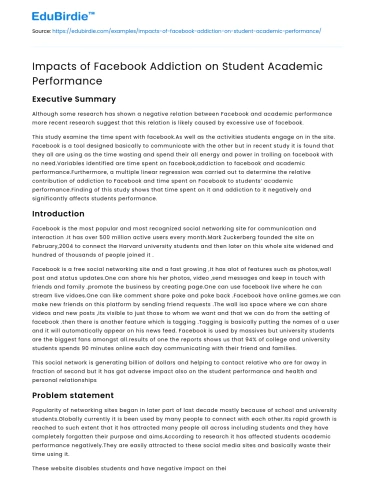Introduction
The ubiquity of social media in modern society has introduced a plethora of both opportunities and challenges, particularly affecting younger demographics such as students. Facebook, as a leading social media platform, has garnered attention for its dual-edged impact on academic performance. While it offers an array of educational resources and connectivity advantages, the potential for addiction poses a significant threat to students' academic success. This essay examines the detrimental effects of Facebook addiction on student academic performance, exploring the mechanisms through which excessive use undermines educational outcomes. By analyzing empirical studies and real-life cases, this paper aims to elucidate the complexities of social media addiction, providing a nuanced understanding of its educational implications. Furthermore, it will address counter-arguments to present a balanced perspective on this contemporary issue.
Digital Distractions and Academic Decline
Facebook addiction, defined as the compulsive use of the platform at the expense of other activities, primarily stems from its design which is tailored to capture and retain user attention. Research by Kirschner and Karpinski (2010) highlights a negative correlation between social media use and academic performance among college students. Their study found that students who used Facebook more frequently had lower GPAs than those who did not. The intricate nature of this relationship can be attributed to digital distractions which lead to diminished concentration and reduced study time. For instance, students often find themselves entangled in endless scrolling or engaging in extended conversations, subsequently compromising their academic responsibilities.
Save your time!
We can take care of your essay
- Proper editing and formatting
- Free revision, title page, and bibliography
- Flexible prices and money-back guarantee
Furthermore, the concept of multitasking, often perceived as a skill, is detrimental in the context of academic tasks. Junco and Cotton (2012) demonstrated that students who engaged in Facebook use while studying experienced a significant drop in their academic performance. The constant influx of notifications and updates can fragment a student's attention, leading to suboptimal learning outcomes. In this regard, the cognitive load theory posits that the human brain has a limited capacity for processing information, and the additional burden of social media notifications can hinder the learning process. Thus, Facebook addiction not only steals valuable time but also disrupts cognitive function essential for academic success.
Psychosocial Impacts and Educational Implications
Beyond the direct impact on study habits, Facebook addiction can engender broader psychosocial issues that indirectly affect academic performance. The platform's emphasis on social comparison can exacerbate feelings of inadequacy and anxiety among students. A study by Kross et al. (2013) found that increased Facebook use was associated with declines in subjective well-being, which can translate into poorer academic outcomes. Students preoccupied with maintaining their online personas may experience stress and depression, detracting from their educational engagement and motivation.
Moreover, the pressure to be constantly connected can lead to sleep deprivation, a critical factor in educational attainment. According to a study by Wolniczak et al. (2013), students addicted to Facebook reported significantly poorer sleep quality compared to their non-addicted peers. Sleep is crucial for memory consolidation and cognitive function, and its deprivation can severely impair learning and academic performance. Therefore, the psychosocial repercussions of Facebook addiction extend beyond immediate academic distractions, influencing emotional health and sleep patterns that are vital for educational success.
Counter-Arguments and Balanced Perspectives
While the negative impacts of Facebook addiction are substantial, it is crucial to acknowledge potential counter-arguments. Proponents of social media argue that platforms like Facebook can serve as valuable educational tools. They provide access to academic resources, facilitate group study sessions, and foster global connections that enhance learning opportunities. For example, virtual study groups and academic pages can offer support and information sharing that may not be available in traditional educational settings.
However, the effectiveness of these benefits is contingent upon moderated use. The distinction between beneficial use and addiction is critical; when students learn to harness Facebook's educational potential without succumbing to its addictive nature, they can indeed gain an academic advantage. Educators and policymakers must focus on digital literacy programs that emphasize the judicious use of social media, encouraging students to develop self-regulation skills that mitigate addictive behaviors. Thus, while Facebook can be a double-edged sword, its impact on academic performance largely depends on the user's ability to maintain a balanced approach.
Conclusion
In conclusion, Facebook addiction presents a formidable challenge to student academic performance, characterized by digital distractions, psychosocial issues, and potential sleep deprivation. The platform's design, while offering educational benefits, also predisposes users to addictive behaviors that undermine educational outcomes. By understanding the intricate relationship between Facebook use and student performance, educators, students, and policymakers can work towards strategies that promote healthy digital habits. Addressing the root causes of social media addiction and fostering a balanced perspective on its use will be pivotal in leveraging the benefits of Facebook while mitigating its detrimental impacts on education. Ultimately, the key to navigating this digital landscape lies in fostering awareness, self-regulation, and an emphasis on purposeful engagement with social media.






 Stuck on your essay?
Stuck on your essay?

